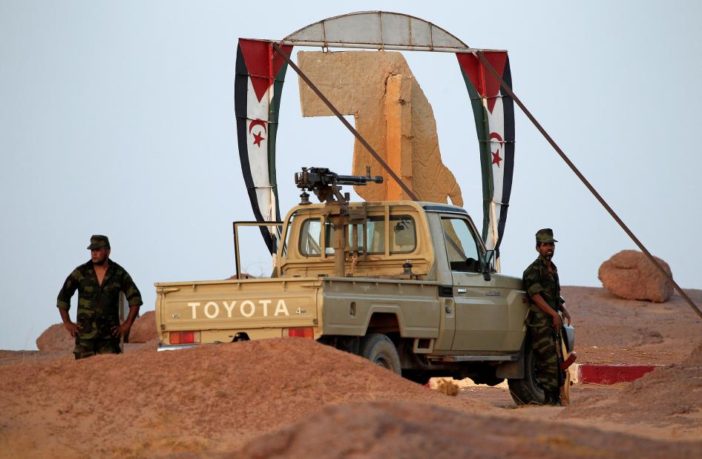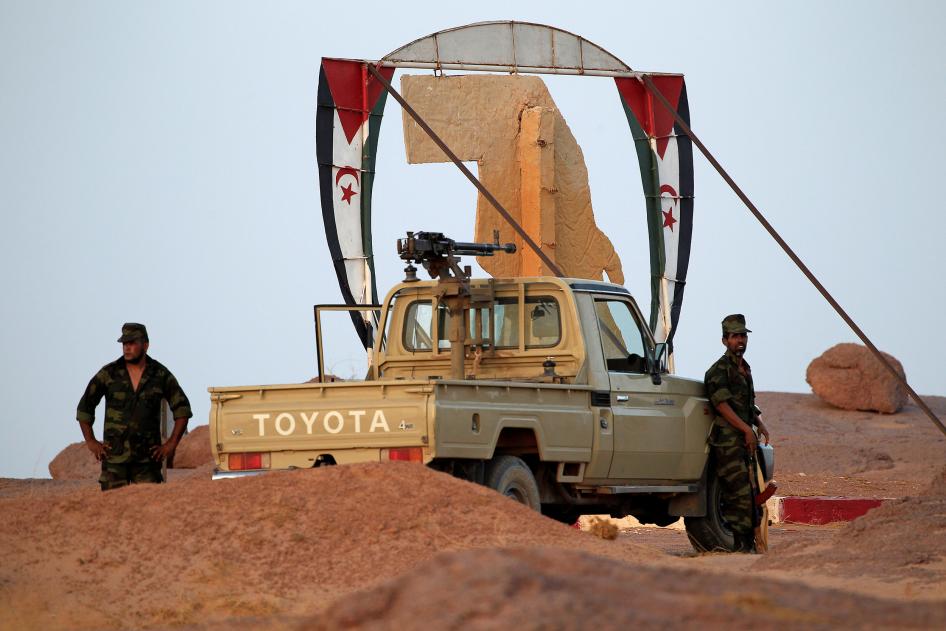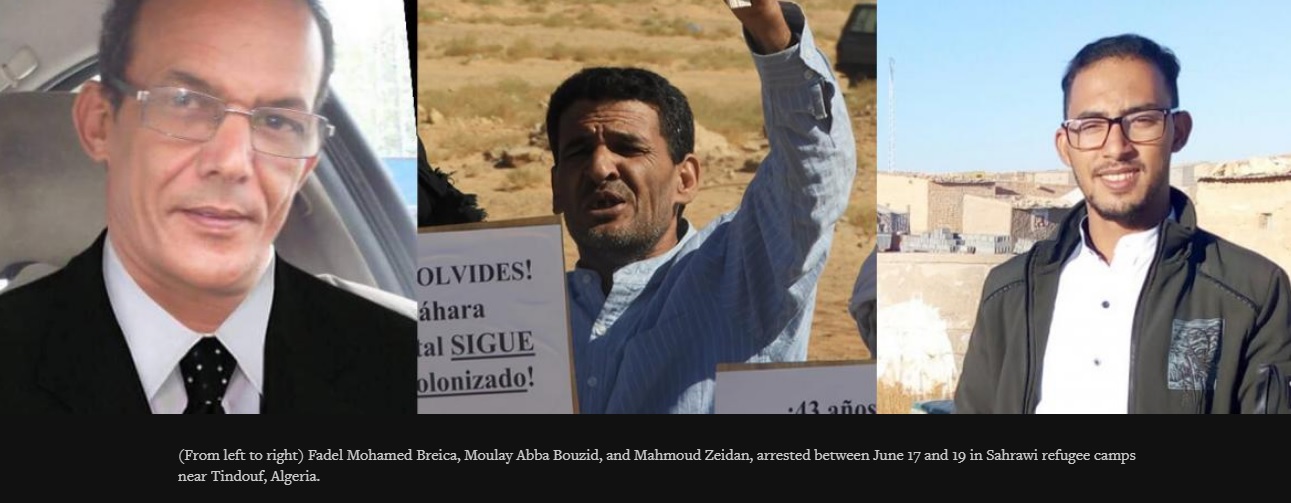Human Rights Watch
Critics of Polisario Front Investigated for ‘Treason’
The government-in-exile that administers the camps in Algeria for refugees from Western Sahara is detaining three critics while an investigating judge explores treason and other charges against them, Human Rights Watch said today.
The men are being held by forces of the Sahrawi Arab Democratic Republic (SADR), which is controlled by the Polisario Front, the liberation movement that seeks self-determination for Western Sahara, most of which Morocco has occupied since 1975. The SADR governs a smaller portion of Western Sahara and also the roughly 100,000 Sahrawi refugees living in camps across the border in Algeria. Sahrawi authorities arrested the three men – Moulay Abba Bouzid and Fadel Mohamed Breica, both activists, and Mahmoud Zeidan, a journalist – between June 17 and 19, 2019. Breica also holds Spanish citizenship.
“Sahrawi authorities should show credible evidence that Bouzid, Breica, and Zeidan may be guilty of genuinely criminal acts and not just peacefully criticizing the Polisario,” said Lama Fakih, acting Middle East and North Africa director at Human Rights Watch. “If they don’t have evidence to justify criminal charges, they should release all three.”
A communique from a SADR court dated June 20 said the three men will be investigated for slander, insults, and “incitement to disobedience.” In an email received on July 15 by Human Rights Watch, Sidi Omar, the UN representative for the Polisario Front in New York, wrote, “the defendants remain in preventive custody under judicial investigation [for charges including] treason against the nation, acts of aggression against the Sahrawi State, sedition, vandalism, defamation and slander.” The charges carry sentences ranging from five years to life in prison. However, a month after arresting the men, the authorities have yet to divulge the grounds for the charges.
As of July 15, the three men were detained in Dhaibiya prison outside Rabouni camp, the headquarters of the Polisario Front government near Tindouf, Algeria.
Bobbih Abba Bouzid, Bouzid’s brother, told Human Rights Watch on July 5 that the authorities had allowed Sidi Ahmadi, a cousin of Bouzid’s, to visit him on June 23. Bouzid told Ahmadi that the authorities had allowed him to leave his cell only once and that they handcuffed and blindfolded him during multiple interrogation sessions, Bouzid’s brother said. The authorities ended the visit after five minutes when the prisoner started to tell his cousin about the questions his interrogators had asked him, the brother said. A July 2 visit by Bouzid’s lawyer ended the same way, with authorities ending the visit when Bouzid started discussing his interrogation sessions and said that interrogators had tried to force him to sign a written confession, his brother said.
Ahmadi visited Bouzid again on July 11 in Dhaibiya prison. After the visit, he circulated a communiqué on social media in which he said Bouzid signed written confessions after several Polisario security officers came into his cell and threatened to torture him.
Breica’s sister, Fatimatou Al Mahdi Breica, told Human Rights Watch that she visited him on July 11, in Dhaibiya prison. He told her he was arrested by several security agents who emerged from four military trucks, as he was walking out of a medical center in Rabouni on June 18, she said. He told her that he was interrogated on and off during nine days in an undisclosed location, always while handcuffed and blindfolded.
If security agents indeed questioned Bouzid and Breica while they were handcuffed and blindfolded, and threatened or intimidated them to sign written confessions, that would gravely compromise the requirement under international law that a confession be made voluntarily, Human Rights Watch said.
The three men are known as dissidents in the refugee camps. While they support resisting Morocco’s occupation of Western Sahara, they have posted numerous Facebook posts severely criticizing the Polisario’s leadership in recent months.
On May 8, Bouzid commented sarcastically about the lack of freedom of opinion and speech in Rabouni, a week after he denounced the “tyranny and dictatorship” of the Polisario’s leadership. On June 12, Zeidan criticized the “absence of dialogue” and the “lack of alternatives to repression” in the camps. On June 16, Breica wrote that the Polisario’s “corrupt leadership” was “trembling [in reaction] to what is happening to their masters in Algeria,” a reference to the wave of street protests that forced the resignation of President Abdelaziz Bouteflika.
Said Zarwal, a Sahrawi journalist based in Sweden, told Human Rights Watch that Zeidan worked as a journalist until 2018 at RASD-TV, the Polisario’s official station.
Bouzid was active in the March 5th movement, a dissident group founded on March 5, 2011, in the wake of the Arab uprisings that year, to demand reforms in the Polisario’s governance, including an end to corruption and tribalism, and sweeping changes of leadership.
Bouzid and Breica are also members of the Sahrawi Initiative for Change, and Zeidan is a founding member of the Youth Sahrawi Forum for a Solution. Both groups, which are based in Spain, challenge the Polisario leadership and favor exploring new ways to settle the 44-year-long conflict with Morocco over the political fate of Western Sahara.
In the July 15 email he sent to Human Rights Watch, UN Polisario representative Sidi Omar wrote, “once their cases are referred to the court, the defendants will have a fair and transparent trial with all the rights and guarantees under the SADR laws.” Both the SADR, which governs the refugee camps, and Algeria, the country that hosts them and where the men are detained, have a responsibility to guarantee respect for human rights in the camps.
“Algeria cannot subcontract the protection of human rights on its territory and turn a blind eye if the Polisario violates them,” Fakih said.









